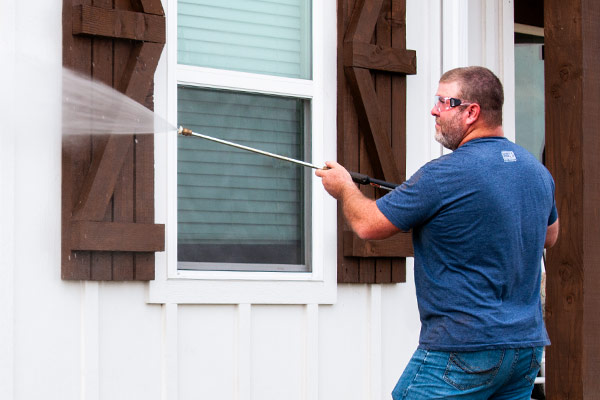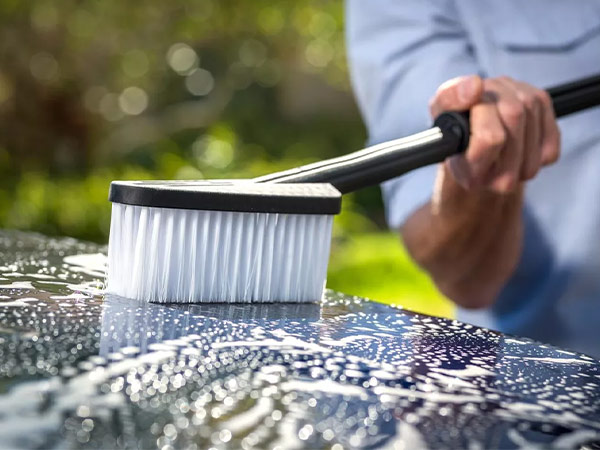

Pressure Washers: Tips to Get You Started and Keep You Safe
If the state of your outdoor spaces is frightening, a pressure washer can clean up the dingiest driveway, brighten up your patio furniture, or even prep your home for a new coat of paint in no time. It’s a versatile tool to add to your collection to clean just about anything. Here are a few tips to consider before you pick out your new favorite tool.
Types of Pressure Washers: Gas vs. Electric
Pressure washers are measured by water pressure in PSIs (pounds per square inch) and flow rate in GPMs (gallons per minute). PSI measures the pressure of the water flow, while the GPM measures the amount of actual water flowing from the machine. So, a higher PSI means you have more pressure from the water, while a higher GPM means you have a greater amount of water flowing which washes the mess away more quickly.
There are two types of pressure washers—gas and electric. Here are a few tips to decide which type is best for your job.
- Gas pressure washers are ideal for heavy-duty jobs, such as cleaning large areas of stained concrete or decks. They have a higher PSI making them much more powerful and also louder than electric pressure washers. You do have to pull a cord to start them, and they require more maintenance such as adding fuel, changing the oil, and replacing the spark plugs when necessary.
- Electric pressure washers are better for lighter, household jobs such as cleaning your outdoor furniture, windows, driveway, fence, or the siding on your home. They weigh less and therefore are easier to maneuver. You simply plug in an electric power washer and get to work. They do typically have a lower PSI, but they make less noise and require minimal-to-no maintenance.

Accessories for Pressure Washers

There are many accessories you can add to your pressure washer to enhance effectiveness and customize its abilities.
- Nozzles come in a variety of types that are color-coded to distinguish them. They are attached to the end of the spray wand, and spray in a V-shape pattern in a narrow or wide width. You can choose the degree of the angle. The smaller the angle, the narrower the spray. A 15° angle is narrower, for example, than a 40° angle.
The narrower the angle (smaller degree nozzle), the more pressurized the water flow is, but the less of the surface is covered. The wider the angle (larger degree nozzle), the less pressurized the water flow is, but more of the surface is covered. Simply customize which nozzle you use to suit your task at hand.- Red (0°): Use with caution! This pressure can damage most surfaces.
- Yellow (15°) This pressure can clean concrete and strip paint. It can be damaging to other surfaces.
- Green (25°) This pressure is well suited for cleaning most surfaces such as decks, patios, and even fences.
- White (40°) This wide-spray angle is wonderful for window washing.
- Black or pink (65°) This angle is used with cleaning agents when washing surfaces as the opening is large enough for a soap dispenser to work through.
- Brushes allow you to clean larger areas of concrete driveways or patios and wooden decks. Some varieties have spinning bristles that clean surfaces quickly and evenly, while some require you to do the scrubbing.
- Wands extend the reach of your pressure washer, so you can reach higher places such as gutters or the siding on your home. Some wands can reach as high as 25 feet, but keep in mind that the pressure decreases with the longer wands. A wand can definitely be worth it to save your back when you have a big job like a long driveway!
- Cleaners help with clean up of driveways and decks. You can use a specific cleaner for what you’re cleaning–from greasy garage floors to decks. We have detergents and heavier duty chemicals which can dissolve stains and also prepare different surfaces for painting.
Safety Tips
Follow these safety tips to make sure you clean your outdoor space without injury.
- Wear closed-toed shoes, goggles, and work gloves to protect your skin.
- Use caution with people and animals nearby. Never point the pressure washer at anyone, and don’t point the washer at any creatures either.
- Use caution with more powerful gas-powered pressure washers. Never use these in an enclosed space as they emit carbon monoxide. Use electric power washers for these jobs.
- Protect your family by keeping kids and pets away while using a pressure washer.
- Don't stand on a ladder when using a pressure washer–ever! Rather, buy a wand for those hard-to-reach jobs.
How to Use a Pressure Washer
Here are a few details to keep in mind when using a pressure washer.
- Before you get started, cover bushes, light fixtures, and anything that you don’t want pressure washed.
- Never drive water into cracks or gaps of your house, as this can damage your home.
- Start with a cleaner. Follow the instructions on the label.
- Always clean from the bottom of a vertical surface in an upward direction with soap to avoid dirt streaks. When using just water, start from the top down.
- Keep your distance when spraying a surface. Stand at least three feet away and increase the distance up to ten feet if using high pressure.
- Read the manual for your pressure washer and follow the instructions.
- Test a small area of what you’re cleaning first to make sure you won’t damage the surface you want to clean.
- Remember to release water pressure before changing nozzles. Turn the washer off and depress the trigger first.
- After you select the nozzle you want to use, connect the water hose and squeeze the trigger gently for about a minute to release air.
- If you’re using a gas pressure washer, remember to check the fuel and oil levels before you get started.
Pressure washing is a great weekend project to get your house, fence, or patio looking their best. We have what you need–gas or electric–and all the accessories to go with it. Come shop in-store or online.
